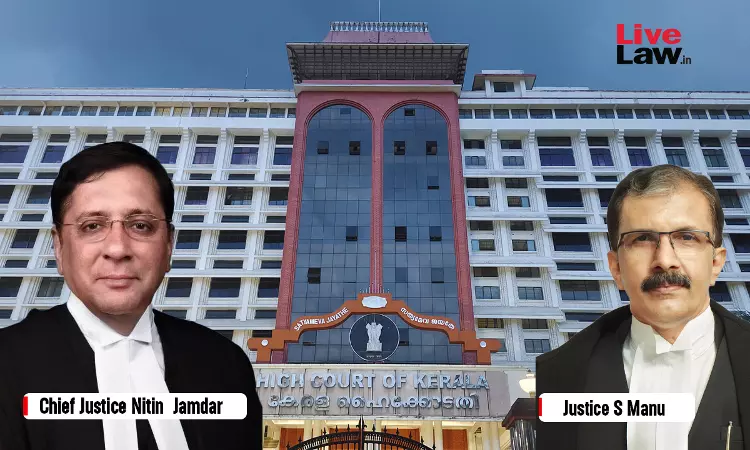- Home
- /
- High Courts
- /
- Kerala High Court
- /
- Info Which Though Not In Possession...
Info Which Though Not In Possession But Can Be Accessed By Co-Operative Society Registrar Can Be Sought Under RTI: Kerala High Court
Manju Elsa Isac
8 May 2025 3:15 PM IST
The Kerala High Court has said that information which can be accessed by the Registrar of the Co-operative Society is also an information which can be sought through a Right To Information (RTI) Application.The RTI applicant had sought from the Registrar of the Co-operative Society, details of the agreement entered into by the Co-operative Society and a Labour Contract Society and the copies...
The Kerala High Court has said that information which can be accessed by the Registrar of the Co-operative Society is also an information which can be sought through a Right To Information (RTI) Application.
The RTI applicant had sought from the Registrar of the Co-operative Society, details of the agreement entered into by the Co-operative Society and a Labour Contract Society and the copies of the last general body meeting through an application under Right to Information Act, 2005. The applicant is a member of the co-operative society. The Chief Information Commissioner had directed the Register to call for the said information from the Society. The Single Judge dismissed the writ petition filed by the Society challenging the CIC's direction. Against this order the society moved the division bench in appeal.
As per Section 2(f) of RTI Act, information relating to any private body which "can be accessed" by a public authority under any other law for the time being in force is an information which can be sought through the Act.
A division bench of Chief Justice Nitin Jamdar and Justice S. Manu relied on Supreme Court decision in Thalappalam Service Cooperative Bank Limited and Others v State of Kerala and Others (2013) which held that the information which is accessible to the Registrar as per the the Kerala Cooperative Societies Act, 1969 can be considered as information which is held or under the control of public authority.
Thus, the High Court concluded that the question for consideration is whether the information sought is one which can be accessed by the Registrar.
The Society argued that under Section 66 of Kerala Cooperative Societies Act, Cooperative Societies are required to submit certain documents to the Registrar, and only these specific documents, which are in the custody of the Registrar, can be accessed under the RTI Act.
The division bench however observed that while these documents are indeed available with the Registrar and can be disclosed under the RTI Act, this does not mean they are the only documents that can be accessed. It thereafter perused Section 2(f) RTI Act and observed:
"Reading of Section 2(f) of the RTI Act makes it clear that Parliament has deliberately employed the phrase "can access" to emphasise the legal entitlement of a Registrar to obtain certain documents. Had Parliament intended to restrict the scope of access solely to documents that had already been physically obtained by the Registrar, it would have employed different language, such as "has accessed" or "is in possession of." The deliberate choice of "can access" signifies that the right to seek information extends beyond mere physical custody of the documents with the Registrar and includes those documents that a Registrar has the statutory power to access. This phrase does not imply that the Registrar can only ask for documents when an inquiry is already in progress. Without these documents, the Registrar may be unable to determine whether an inquiry is necessary in the first place. Therefore, imposing a requirement that an inquiry must already be underway before documents can be accessed would be contrary to the intent and purpose of the statute. Thus, the phrase "subject to the limitations of the statute" should be understood as a guiding principle that ensures the Registrar's powers are exercised within legal bounds rather than as a restriction that would prevent access to documents unless an inquiry has already been initiated. This interpretation is in consonance with the broader objective of the RTI Act, which is to ensure transparency and accountability in the governance of the cooperative society as well"
The Court noted that as per Section 65 of the Kerala Cooperative Societies Act, Registrar has the power to access documents and other things of the society for the purpose of the inquiry. Under Section 66, the Registrar has the power to inspect the books of the society. To this, the society contended that the provisions are meant for supervision and inspection of the affairs of the Society. It was further argued that since there was no enquiry against the society, there was no question of accessing the documents of the Society.
The Court however rejected this argument saying that imposing a requirement that an inquiry must already be underway to access the documents would be contrary to the intent and purpose of the statute. Further, the court observed that the Registrar will be able to determine if an inquiry is necessary only after going through the documents. The Court added that what needs to be seen is Registrar is acting within the legal bounds rather than preventing access to the documents unless an inquiry has been initiated.
The Court also held that the information sought is not exempted under Section 8 of the RTI Act.
Accordingly, the appeal was dismissed and the single judge's order was upheld.
Case Title: The Muppathadam Service Co-operative Bank v The State Chief Information and Others
Case No: WA 2105 of 2024
Counsel for the Appellants/Petitioners: Senior Advocates P. Ravindran and P. Deepak, advocates Aparna Rajan, Lakshmi Ramadas, M. R. Sabu, Sreedhar Ravindran
Counsel for the Respondents: Advocates P. R. Ramachandran, M. Ajay (SC), V. Tekchand (Sr. GP)
Citation: 2025 LiveLaw (Ker) 266
Click Here To Read/ Download Order



